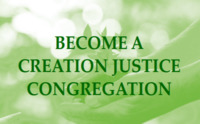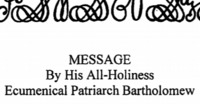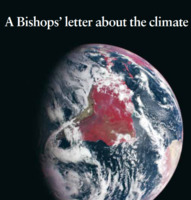Search
143 items
-
Global Climate Change A Plea for Dialogue Prudence and the Common Good
A Statement of the United States Conference of Catholic Bishops was issued on June 15, 2001. This document covers a multitude of current environmental problems and the resulting negative impact on populations around the world - especially with regard to indigent populations. It stressed the connectivity of human behavior and it's impact on the planet. -
America Baptist Churches USA (ABCUSA) Creation Justice Congregations Bulletin
America Baptist Churches USA (ABCUSA) has created a bulletin insert that discusses how congregations can earn certificates of achievement for implementing eco-justice measures. Further details are discussed below:
"Creation Justice Congregations is an environmental education, stewardship, and justice program sponsored by the Creation Justice Network of the American Baptist Churches USA. Through this program your congregation can earn certificates of achievement for implementing eco-justice measures in your building, within your congregations, and in your ministries of outreach and justice.
Creation Justice Congregations has three stages, each with a checklist of suggested education, worship, and other action items that can help bring Baptist churches into the wider movement for peace, justice, and reconciliation with all of God's creation. " -
Message by His All-Holiness Ecumenical Patriarch Bartholomew to the United Nations Conference of the Parties (COP 24) (Poland)
Ecumenical Patriarch Bartholomew I of Constantinople addressed the United Nations of the Parties (COP 24) in Poland, December 3-14, 2018. He emphasized the collective responsibility among all citizens to alleviate the climate problems. One key point includes the urgency to focus on lighter carbon footprints to preserve the Earth to assist in alleviating poverty and suffering.
-
Keynote Address by His All-Holiness Ecumenical Patriarch Bartholomew at the Arctic Circle Assembly
Ecumenical Patriarch Bartholomew I of Constantinople addressed the Arctic Circle Assembly in Reykjavik, October 13, 2017. Below is a section of the keynote address, focusing on the impact of climate change with regard to the Arctic Circle:
"Scientists tell us that the Arctic is a vibrant image and vivid mirror of the state of our planet as a whole. For scientists, the Arctic is the barometer of the globe's environmental health. The ecological misdeeds committed in other regions – including chemical contamination and nuclear radiation – are clearly evident in the Arctic environment. Above all, the dramatic rise in global temperatures is having a palpable effect on the Arctic landscape. Nevertheless, so many industrial societies and activities that cause climate change are often blind to the consequences of their behavior. But here, in the Arctic Circle, it is possible to see all manner of things so much more clearly. When we visit this pristine part of the planet, we cannot hide our eyes, either from the beauty of God’s creation or from the changes which human folly has generated. Nor can we avoid pondering the terrible consequences for the remainder – and the future – of the world, if glaciers continue to melt and sea-levels continue to rise." -
Message of His All Holiness Ecumenical Patriarch Bartholomew on the Day of the Protection of the Environment
Patriarch Bartholomew I of Constantinople delivered a speech on January 9, 2018 for the Day of Prayer for the Protection of the Environment. The following one salient excerpt from the speech:
"The Ecumenical Patriarchate’s ecological initiatives provided a stimulus for theology to showcase the environmentally-friendly principles of Christian anthropology and cosmology as well as to promote the truth that no vision for humanity’s journey through history has any value if it does not also include the expectation of a world that functions as a real “home” (oikos) for humanity, particularly at a time when the ongoing and increasing threat against the natural environment is fraught with the possibility of worldwide ecological destruction. This evolution is a consequence of a specific choice of economic, technological and social development that respects neither the value of the human being nor the sanctity of nature. It is impossible to truly care for human beings while at the same time destroying the natural environment as the very foundation of life, essentially undermining the future of humanity." -
Common Declaration on Environmental Ethics
Pope John Paul II and the Ecumenical Patriarch His Holiness Bartholomew I delivered a speech titled Common Declaration on Environmental Ethics on June 10, 2002. Below is the introduction within the declaration, focusing on the current state of the poor and the consequences of natural degradation:
"We are gathered here today in the spirit of peace for the good of all human beings and for the care of creation. At this moment in history, at the beginning of the third millennium, we are saddened to see the daily suffering of a great number of people from violence, starvation, poverty and disease. We are also concerned about the negative consequences for humanity and for all creation resulting from the degradation of some basic natural resources such as water, air and land, brought about by an economic and technological progress which does not recognize and take into account its limits." -
A Bishops’ Letter about the Climate
Below is a section of the introduction from A Bishops’ Letter about the Climate, which covers a multitude of critical environmental issues, from the 2014 Bishops' conference:
"We have lived with reports and forecasts of climate change since the 1980s. Our climate is the result of the interaction of complex systems and there is often a great distance between cause and effect in terms of both space and time. There are uncertainties and a lack of clarity. However, the knowledge we possess today does not allow us to postpone until tomorrow
what needs to be done now. Our human climate impact must decrease for the sake of the earth, for the sake of the world that God so loves that God gave us Jesus Christ." -
The world is our host: A call to urgent action for climate justice
Anglican Bishops from around the world discuss various environmental complications resulting from climate change. They provide a list of initiatives of commitment that they have pledged as a church, some of which include strengthening collaboration among partners, developing and distributing educational resources and liturgical materials, and strengthening of ethical investment guidelines. They also list actions that individuals can take to support their mission. -
Episcopalians Confronting Climate Change
This article discusses American Episcopalians' concern over climate change and the impact with regard to those facing poverty. The introduction to the article is stated below:
"In September 2011, the House of Bishops in the Episcopal Church, attending a meeting in Quito, Ecuador, sent a pastoral letter to Episcopal clergy worldwide expressing 'mounting urgency' to address climate change within church membership. The letter argued the critical need for Christians to care for all of God’s creation and urged that justice be sought for the poor, who it said will suffer most from climate change." -
The Hope We Share: A Vision For Copenhagen
The Anglican Communion Environmental Network addressed the United Nations Framework Convention on Climate Change (UNFCCC)
Conference Of Parties (COP) Meetings, the Fifteenth Session, held in Copenhagen, Denmark in December 2009. They lament the consequences of environmental human footprints, some of which include the lack of drinkable water in various parts of the world, the increased difficulty to grow crops due to the water shortages, rampant consumerism, and subsidies for fossil fuels. -
Preachable Moments: Evangelical Christians and Climate Change
This article by Yale Climate Connections provides encouraging news of how some evangelical Christians are re-examining their stance on climate change. The following is an excerpt from the article:
"About 60 percent of evangelicals think climate change has nothing to do with human activities. By comparison, less than half of all Americans, or 47 percent, share that view. (Both figures are in sharp contrast to the overwhelming majority of climate scientists who agree that climate change is occurring and primarily caused by human actions).
Richard Cizik sees climate change as ‘top-tier issue’ for younger evangelicals. But the theological doors are beginning to open. Signs are that more evangelicals now are addressing climate change as a moral issue that appeals to the conscience of their Christian communities." -
Climate Change: An Evangelical Call to Action
This statement on climate change from members of the Evangelical Climate Initiative encourages church leaders and congregation members do what they can to take action to protect the Earth. A brief description of the group is provided below:
"The Evangelical Climate Initiative (ECI) is a group of over 300 senior evangelical leaders in the United States who are convinced it is time for our country to help solve the problem of global warming. We seek to do so in a way that creates jobs, cleans up our environment, and enhances national security by reducing our dependence on foreign oil, thereby creating a safe and a healthy future for our children. Our deep commitment to Jesus Christ and his commands to love our neighbors, care for “the least of these,” and be proper stewards of His creation compels us to act. Our views are articulated on the ECI statement page." -
ELCA issues statement on Pope Francis’s encyclical on climate change
In an effort to demonstrate solidarity of interfaith-based environmental action, the Evangelical Lutheran Church in America released a statement in support of Pope Francis's encyclical on climate change. The following concluding excerpt emphasizes the movement of solidarity within the statement:
"Today we join with Pope Francis in calling on world leaders to embrace our common responsibility as work continues toward a global agreement on climate change. We urge leaders to support an ambitious agreement that reduces greenhouse gas emissions, encourages development of low-carbon technologies, and supports the ability of countries to cope with the effects of a changing climate and build resiliency for a sustainable future." -
Lutherans Reflect on Climate Change Conference in Copenhagen
This article discusses some of the sentiments regarding proceedings from the 2009 United Nations Climate Change Conference in Copenhagen. While some attendees expressed disappointment in the outcome, others were more optimistic about steps which may lead to more effective action for climate change in the future. The following excerpt provides a brief description of the event:
"More than 3,000 ELCA members, along with a coalition of U.S. faith leaders, sent some 20,000 postcards to President Barack Obama, urging him to be at the meeting, she said. Obama attended the conference and urged leaders of Brazil, China, India and South Africa to join the United States 'to fund developing nations' projects to deal with droughts,
floods and other impacts of climate change, and to develop clean energy,' among other agreements, according to a U.N. news release." -
Why Lutherans Care for Creation
This article discusses how various concepts of Lutheran theology are woven into ecological messages with regard to God as creator, human interactions, and ways of worship. The following is a section from the introduction of the article, emphasizing human responsibility towards care for the Earth:
"For Christians, care of the Earth is not an 'environmental cause.' Rather, it is central to our holy calling to treasure the Earth and to care for it as our common home, fully integrating creation-care into our love of God and neighbor. Without sacrificing the transformational effects of the 16th-century Reformation, we are called to embrace an eco-reformation that will re-examine and rethink how we read the Bible, how we can expand the scope of our theology, how we can reconfigure our personal vocation and our common ethic, how we worship, how we organize our church life together, and how we understand ourselves as creatures within creation as a whole. This call to continuing reformation is for the whole church, not solely for the committed. Earth care is not an add-on. It is not just for those who happen to be interested in it. It is a call for all Christians to participate in this great work of our time." -
Caring for Creation Today
This video, put forth by the Evangelical Church in America, encourages individuals to act as stewards by both assisting those in need and caring for our land, as God had intended. The salient message is to do what you can to work for change and care for God's creation, as this is our duty as humans. -
The Coalition on the Environment and Jewish Life
The Coalition on the Environment and Jewish Life (COEJL) is a group within the Jewish Council of Public Affairs that focuses on environmental issues within the Jewish community. Their focus is on utilizing Jewish environmental knowledge to serve as a voice within in the broader interfaith community, through outreach and activism. Working among a network of Jewish leaders, institutions and individuals, COEJL seeks to conserve energy, increase sustainability, and advocate for policies that increase both energy efficiency and security. -
Engaged Organizations: Islamic Society of North America
The Islamic Society of North America, headquartered in Plainfield, Indiana, has been described as the largest Muslim community in North America. Their vision includes empowerment of the Muslim community to strengthen interfaith relations, increase civic engagement, and promulgate a better understanding of the Islamic faith. They strive for organizational excellence, achieving this in part through their efficient operations, transparency, and financial stability. They seek to achieve their strategic goals by providing high quality programming and services for the Muslim community, increasing opportunities for civic engagement, and hosting an annual convention to gather in large numbers and discuss current issues that are affecting their community.
Part of the organization's mission is to focus on increasing sustainable practices within the Muslim community. Through the work of the Masjid Development Committee in December 2014, the ISNA Green Masjid Initiative Team was formed as “Green Masjid Task Group” and later renamed the "ISNA Green Initiative." The intent was to create awareness and to provide guidance on transforming mosques/Islamic centers to become more environmentally friendly through the use of sustainable practices.


















